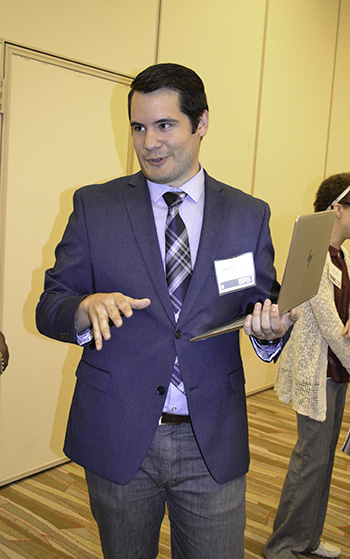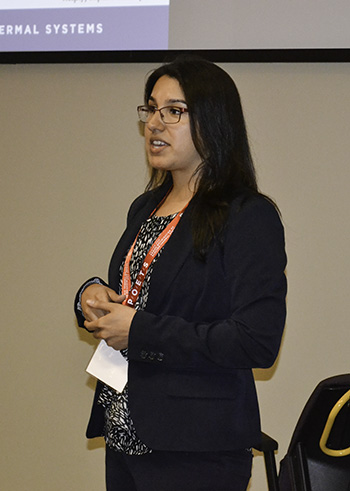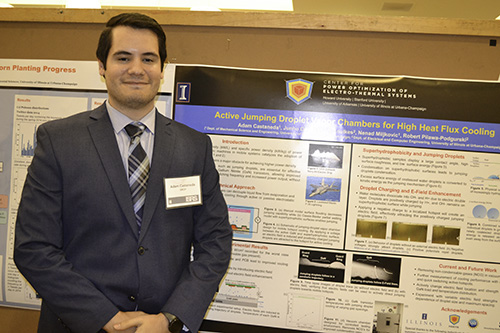POETS' REU Exposes Undergrad Students to Electro-Thermal Systems Research
August 21, 2017
 Adam Castaneda presents his research at the Illinois Summer Research Symposium.
Adam Castaneda presents his research at the Illinois Summer Research Symposium. Ever wish your electronic devices were faster and more powerful? As part of the 10-week Research Experience for Undergraduates (REU) sponsored by the POETS (Power Optimization for Electro-Thermal Systems) Engineering Research Center, four undergraduate students had an opportunity this past summer to learn more about this issue. Their goal was to not only participate in current research to put more power into less space in our electrical technologies, but possibly help do something about it.
POETS’ 2017 REU program had one undergraduate student at each of the four POETS universities: Illinois, Arkansas, Howard, and Stanford. While all students participated for ten weeks, they started and finished at different times based on each school’s schedule. Because students were placed at four different institutions, they each had unique opportunities as POETS took advantage of the various offerings at each of the schools.
“So the program looks very different at the different schools,” says POETS’ Associate Director of Education and Inclusivity, Jessica Perez, “but we're hoping that we can unify them through POETS, through the different things that we do.”
For instance, all four students participated in biweekly webinars so they could understand the research at POETS. Each student also did a research presentation during the June 28th webinar, which enabled students to talk about the research they did this summer as well as interact with graduate students at the four institutions.
“So it's good exposure for the students,” Perez explains, “and then graduate students can ask the REU students questions about their research and also learn about what other research is happening at the different institutions, because the REU students are like a rep for whatever research group they are in.”
Perez indicates that each of the universities had programming to helped prepare the students for graduate school: how to apply, and preparation for the GRE, which they need to take prior to applying to graduate school. Some students attended research talks to hear about research going on at the various campuses.
In addition, because Illinois and Stanford already have large summer research programs in place, the REU students at those schools had access to additional resources. For example, Adam Castaneda, Illinois’ REU participant, partnered with SROP (the Graduate College’s Summer Research Opportunities Program) to take advantage of their programming as well. However, although Howard and Arkansas don't have similar research programs in place, faculty gave their REU students the same types of opportunities. In addition, all student participants made final research presentations at their schools; for instance, Adam Castaneda presented his research at the Illinois Summer Research Symposium on July 20–21. Students were also encouraged to take advantage of social events on campus and in their labs.
Perez expains the selection process to POETS' REU: to disseminate information to potential participants, information was posted on POETS' website, plus staff emailed numerous schools about the opportunity. Around 60 people from all over the country applied for four positions. And to ensure that the students would be successful in the program, students who were “very good academically” were chosen.
 Jessica Perez, POETS' Director of Education and Inclusivity.
Jessica Perez, POETS' Director of Education and Inclusivity. “But for us,” Perez says, “we also want to focus on broadening the participation in science, and so we recruited students that were from a racial minority and that also had some type of need. Maybe their family didn't go to graduate school, for example. Having this exposure is going to be more valuable to someone who didn't get that experience.”
POETS' goal for the REU? To broaden the participation of students going into graduate school.
“If we can help some of these high-achieving minority students continue on their track and get them interested in doing research, that's a win for us," Perez says. "Through the program, we're hoping to increase their confidence in doing research; getting comfortable in a lab environment; interacting with professors; understanding how to go about doing the research process, like how to ask questions and how to set up experiments to answer those questions; and getting some of that confidence.”
According to Perez, the overarching goal for the program, kind of a common theme across all four institutions, is for students to have an increased interest in academic research and a research career. “So we're hoping that by bringing in these students that are high-achieving that come from more of a minority background—that they can be exposed to a research environment and then start to build confidence in their ability to possibly be a graduate student or work in a research environment.”
Perez says another outcome they are striving for is to help students develop a mentor/mentee relationship with their research mentor, either the faculty member, graduate students, or other students in the lab. “Developing those personal connections is really great,” Perez explains, because when the student leaves, they have that connection to whatever REU university they are at. And I think that will help them a lot moving forward in their career. They can be a person they ask advice from, etc.”
 Adam Cstaneda presents his research at the Illinois Summer Research Symposium.
Adam Cstaneda presents his research at the Illinois Summer Research Symposium. For instance, additional time to work with his mentors was what motivated Adam Castaneda, a senior in Mechanical Science and Engineering (MechSE) at Illinois to participate in the POETS REU.
Castaneda reports that during the academic year, he had already been working in a POETS-affiliated lab, MechSE Professor Nenad Malchovich’s Energy Transportation Research Lab (ETRL), on a similar topic related to super hydrophobic surfaces. “When I saw this opportunity come up,” he admits, “I figured, ‘I'm already in the lab; I know what's going on here; I feel like it'd be a pretty seamless transition into the program’” He reports that it was a seamless transition, “but since it was a different experiment, there was still plenty of work that I had to do.”
Perez notes another serendipitous benefit regarding the matchup: “Two of the graduate students he is working with are also POETs graduate students. It’s a great opportunity because it’s an example of inter-generational learning across POETS. We were excited to hear that."
Some of the technical things Castaneda learned about the research area? “Super hydrophobic surfaces are extremely important,” and that “droplets jump off super hydrophobic surfaces.” He also discovered something about himself: “I've learned that there comes a point, despite how much hard work you put in, you still need to reach out to people to help occasionally. One thing about myself is that I'm like ‘I can do it; I can power through it; I don't need help,’ but this research opportunity over the summer made me realize that I need some occasional help when things get overboard.”
Regarding how the overall experience over the summer has impacted his future career plans, Castaneda says it resulted in “definitely making me more seriously consider grad school. Prior to the whole research opportunity, I kind of had it on my mind, but not necessarily something that I wanted to do immediately. I knew I had the option, but I was more in the mindset of, ‘I only have a year left; I can graduate and find myself a nice job!’ But I found myself really enjoying research, and working through the entire experience makes me realize that I think I can find myself going even for a PhD.” Maybe even at Illinois.
Story and Photos by Elizabeth Innes, Communications Specialist, I-STEM Education Initiative
More: POETS, REU, Summer Research, Undergrad, 2017
For additional I-STEM articles about POETS, see:













.jpg)
















